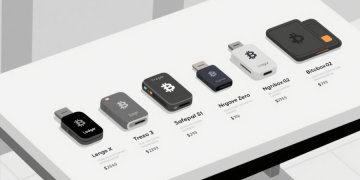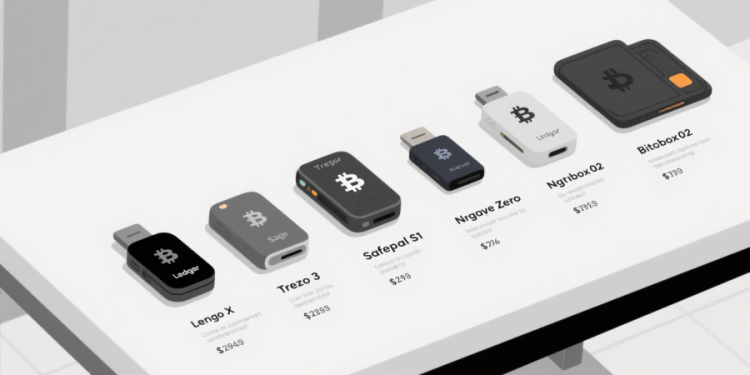In the rapidly evolving world of cryptocurrency, security remains the cornerstone of responsible asset management. With cyber threats and hacking attempts on the rise, safeguarding your digital wealth requires more than just a basic software wallet. Enter hardware wallets—the gold standard for secure crypto storage. In this comprehensive guide, we’ll explore why hardware wallets are indispensable, how they work, and how to choose the right one for your needs. Whether you’re a seasoned investor or a crypto novice, this article will empower you to protect your assets with confidence.
What Is a Hardware Wallet and Why Do You Need It?
A hardware wallet is a physical device designed to store your cryptocurrency private keys offline, away from internet-connected devices that are vulnerable to malware, phishing attacks, and hacking attempts . Unlike software wallets or exchange storage, which keep keys online, hardware wallets provide air-gapped security, ensuring your private keys never leave the device during transactions . This isolation makes them nearly impervious to digital threats, offering peace of mind for investors holding significant assets.
The need for hardware wallets has grown exponentially as the crypto market expands. According to industry reports, the hardware wallet market is projected to reach $1.56 billion by 2029, driven by rising cybercrime concerns and institutional adoption . With over 9,000 cryptocurrencies in existence , the demand for secure, multi-currency storage solutions has never been higher.
How Does a Hardware Wallet Work?
At its core, a hardware wallet generates and stores your private keys on a secure chip, often certified to meet rigorous security standards like EAL 6+ or EAL 7 . When you initiate a transaction, the device signs the transaction internally using these keys, without exposing them to the internet or your computer . This process ensures that even if your computer is infected with malware, your private keys remain safe.
Here’s a step-by-step breakdown:
- Setup: Create a unique PIN and write down a recovery phrase (12–24 words) during initialization. This phrase is your backup if the device is lost or damaged .
- Transaction Initiation: Use a connected device (e.g., a computer or smartphone) to create a transaction.
- Signature Generation: The hardware wallet signs the transaction offline, displaying details on its screen for verification.
- Broadcast: The signed transaction is sent to the blockchain network, completing the process .
This architecture ensures that your private keys are never exposed, even when interacting with decentralized applications (dApps) or DeFi platforms .

Key Features to Look for in a Hardware Wallet
Choosing the right hardware wallet involves balancing security, usability, and compatibility. Here are the critical factors to consider:
1. Security Certifications
Look for wallets with EAL certifications (e.g., Trezor Safe 3’s EAL 6+ or Ngrave Zero’s EAL 7), which validate resistance to physical and digital attacks .
2. Multi-Currency Support
Leading wallets like the Ledger Nano X and Trezor Model T support thousands of cryptocurrencies, including Bitcoin, Ethereum, and Solana . Ensure the wallet aligns with your portfolio.
3. Backup and Recovery
A reliable recovery phrase (BIP39/BIP44 compliant) is essential. Some wallets, like the BitBox02, offer additional backup options via microSD cards .
4. User Interface
Touchscreens (e.g., Trezor Model T) and intuitive navigation enhance usability, especially for beginners .
5. Connectivity
Bluetooth (Ledger Nano X) and USB-C options provide flexibility for mobile and desktop use .
6. Firmware Updates
Regular updates patch vulnerabilities and add new features. Always keep your wallet’s firmware up-to-date .
Top Hardware Wallets in 2025
The hardware wallet landscape is competitive, with innovations emerging regularly. Here’s a roundup of the best options for 2025:
1. Ledger Nano X
- Price: €149
- Features: Bluetooth connectivity, supports 5,500+ cryptocurrencies, secure chip technology .
- Best for: Investors needing mobile accessibility and broad coin support.
2. Trezor Safe 3
- Price: $79
- Features: EAL 6+ certification, Shamir backup for enhanced recovery, supports 8,000+ assets .
- Best for: Budget-conscious users seeking robust security and ease of use.
3. Safepal S1
- Price: $49.99
- Features: Air-gapped signing, Binance integration, supports 10,000+ tokens .
- Best for: Beginners and DeFi enthusiasts on a budget.
4. Ngrave Zero
- Price: $398
- Features: EAL 7 certification, offline recovery, compatible with MetaMask and Rabby Wallet .
- Best for: Institutional investors and security purists.
5. BitBox02
- Price: $154
- Features: Open-source firmware, dual-chip architecture, Bitcoin-focused security .
- Best for: Privacy-focused users and Bitcoin maximalists.
Best Practices for Using a Hardware Wallet
Even the most secure wallet requires responsible usage. Follow these tips to maximize protection:
- Buy from Trusted Sources: Purchase directly from manufacturers to avoid tampered devices .
- Secure Your Recovery Phrase: Write it on steel or fireproof paper and store it offline, away from prying eyes .
- Set a Strong PIN: Use a unique combination of numbers and symbols, avoiding easily guessable patterns .
- Verify Transactions: Always check details on the wallet’s screen before confirming, as malware can alter addresses on your computer .
- Update Firmware Regularly: Manufacturers release patches to address vulnerabilities, so enable automatic updates .
- Use Trusted Devices: Only connect your wallet to devices with updated antivirus software .
Conclusion: Secure Your Crypto with Bitora
Hardware wallets are not just tools—they’re a safeguard against the ever-present risks of the digital world. By investing in a reputable device and following best practices, you can take full control of your crypto assets while minimizing exposure to threats. At Bitora, we’re committed to empowering you with the knowledge and resources to navigate the crypto landscape securely. Stay ahead of the curve with our latest insights, reviews, and guides, and never compromise on the safety of your investments.
Stay Secure with Bitora: Your Trusted Crypto Exchange Guide
This article is brought to you by Bitora, your go-to source for comprehensive crypto exchange insights and security-focused content. Visit Bitora to explore our latest guides and tools.



























